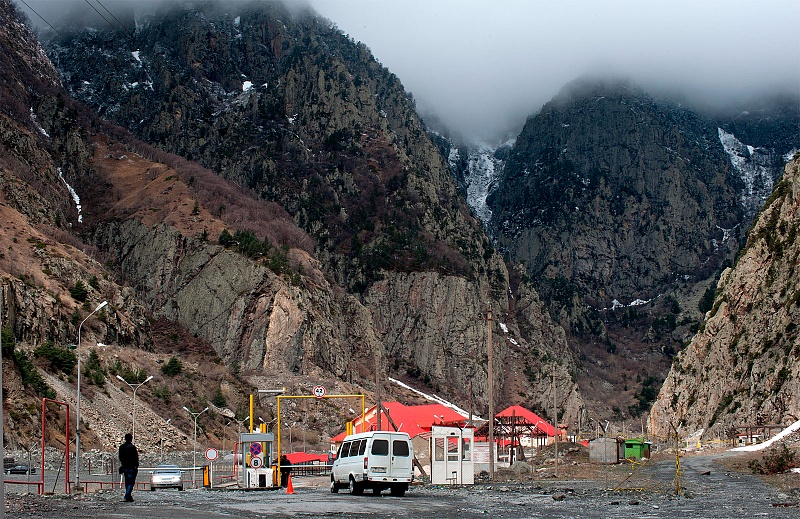Conflict Management in Georgia: Georgian vs. Russian Narratives
In
Log in if you are already registered
On August 13, 2017 a prominent Russian scientist on post-Soviet issues, Sergey Markedonov participated in a radio show, Geopolitical Cuisine, with Igor Shatrov aired by MediaMetrics Radio, dealing with the August 2008 War. During the broadcast both, Shatrov and Markedonov raised some very interesting and significant issues that were presented in scopes of Russian political agenda. We will try to balance the analysis and offer a Georgian narrative.
Three topics can be identified: a) a debate on the possible transformation of Georgia’s political system into a federal or confederal model; b) allegations of treaty violations; and c) assumptions of unchanged Georgian society and unanimity regarding the August 2008 War in general.
Federalism and Confederation
Since the beginning of the conflicts, Russian diplomats actively promoted an idea of ‘Georgian Federation’ or a possible confederation that could have included Georgia, Abkhazia and the so-called South Ossetia. This approach was especially prevalent in the late 90s and early 2000. Even nowadays, Russian experts and scholars argue that Tbilisi should have chosen these options to deal with separatism. during the radio broadcast, Igor Shatrov argued that Georgia was historically a multi-national union and its government should have reflected this background in the country’s political architecture. Additionally, some comparisons were made between Russia and Georgia.
While these arguments may look attractive they do not show the whole picture. The topic of possible formation of federal or confederal union has two challenges.
The first of these challenges are the associated, security issues. As prominent Georgian expert, Mamuka Areshidze argues, Georgia might think about the confederal model but it is crucial to ensure that respective regulations are set in place to avoid unrecognized regions getting away from the metropolis with international approval. Moreover, there is a strong belief among various local actors that Kremlin’s final aspiration is to dominate over Georgia as a whole rather than its secessionist regions. So far, the federal or confederal models can be used by Moscow to undermine their neighbor’s sovereignty and influence Tbilisi via a pro-Russian agenda in Sukhumi and Tskhinvali.
Secondly, Georgia was never a multi-national kingdom or state as, for example, Canada or even Russia itself was and still is. So far, a comparison between Russia’s federal political model and Tbilisi is probably a stretch. Undoubtedly, the state has a history of cohabitation of various ethnical groups. Even though Georgia is a home for approximately ten ethnic groups, they represent only 14% of the whole population. Moreover, while the case of Abkhazia is complicated and Mikhail Saakashvili, former president of Georgia (2004–2013), even offered to recognize Abkhazian as a second state language, the situation in so called South Ossetia is another case. Ossetians that are residents of Tskhinvali region settled there only in XIX–XX centuries and they arguably never reflected a multi-national nature of Georgia. Lastly, the comparison between Moscow and Tbilisi is a nonsensical due simply to the historical background.
Treaty Violations
Representatives of Georgia’s separatist regions and the Kremlin frequently blame Tbilisi for attempts to undermine the so-called Sochi Agreement, a ceasefire agreement that marked the end of Georgian-Abkhazian and Georgian-Ossetian conflicts. This document was signed in Sochi on June 24, 1992 between Georgia and Russia, the ceasefire with Abkhazia was marked on July 27, 1993.
And while this is factually accurate, we should bear in mind that political realities have changed and they must be reflected; the principle that Kremlin is promoting globally. For example, Vladimir Putin frequently argues that the current political order does not represent the redistribution of powers in global politics. Particularly, it is outdated due to the fact that America is still seen as an undisputed political force while the highly increasing role of such countries as Russian Federation, China, India and Brazil is simply overseen. Furthermore, Moscow has already re-negotiated more or less every significant document that was signed during Boris Yeltsin’s governance when the country was politically and economically non-competitive. The same story is applicable to Georgia. The Sochi Agreement was negotiated and signed when Tbilisi was unable not only to handle the separatist regions but even such simple and fundamental tasks such as budget management. However, since then, Tbilisi has made a giant step toward political, economic and social stability and prosperity. Hence, it is logical and is totally suitable to the framework offered by Moscow that Georgia was and is determined to re-settle some aspects of the agreement and balance it according to national interests.
All in all, Russian scholars and experts should decide whether their ‘reality-match’ approach to legal documents is universal, generalizable, or unique, meaning that it is only applicable to big countries, and small states must get used to doing what they can.
2008 August War
One more issue was raised during the broadcasting. Igor Shatrov argued that after the events of the 90s, the residents of the so-called South Ossetia thought that Georgia had changed as a result of democratic reforms. But, the August 2008 War led to a dramatic disillusionment when they realized that Georgian society remained the same.
This assumption is most likely inaccurate due to two facts: a) Georgian society tends to openly recognize its misdeeds; and b) the latest military confrontation was probably more avoidable than that of the 90s.
Of course, Georgia is far away from the Western style democracy but local society is slowly changing and clearly moving forward. As opposite to residents of the separatist regions Georgian society came to a state of condition in which it is capable of re-assessing political decisions and recognizing its share of blame in the conflicts. It has just realized that in order to clap you need two hands; a harsh reality that people in Sukhumi and Tskhinvali are unwilling to take into account.
Secondly, the August 2008 War was probably more predictable and avoidable than those of the 90s. It is rarely mentioned that after political unrests in November 2007 and a questionable outcome of early presidential elections of January 2008, Georgian opposition openly warned about possible military campaign that Saakashvili’s government could have conducted to consolidate political power and increase electoral support. The same statement was made by former ambassador of Georgia to Russian Federation, Erosi Kitsmarishvili. in his memoirs, he stated that Saakashvili had aspiration to solve the Abkhazian issue with a military blitzkrieg (something, that Saakashvili and members of his government called a complete lie). Unfortunately, Matthew Bryza, former Deputy Assistant Secretary of State for European and Eurasian Affairs, assured the George W. Bush administration that these allegations were unfounded. Consequently, the state’s strategic partners that were capable of restraining Saakashvili and making some serious preventive steps were surprised when military confrontation unfolded (it should be mentioned that some Georgian and Russian experts argue that Bush’s administration was aware of Saakashvili’s plans and even supported him). At this point, there was no unanimity between the government and Georgian society that, we may argue, was in place during 90s.
By and large, Russian experts and scholars frequently blame the West for not taking into account Russia’s national interests. They argue that both, US and EU, must realize that Kremlin has its own political agenda and that Vladimir Putin’s government will follow and protect it by all means. Unfortunately, the same people rarely apply the same standards to Georgia and its national interests. And as soon as this is done, Georgian and Russian officials will undoubtedly find a common ground for mutually beneficial political agreements.

Georgian-Russian border point Dariali in the Darial Gorge
Ggia / wikimedia.org Georgian-Russian border point Dariali in the Darial Gorge CC BY-SA 3.0
Founder of the SIKHA Foundation, lecturer at the Tbilisi State University
Blog: Archil Sikharulidze's Blog
Rating: 0




